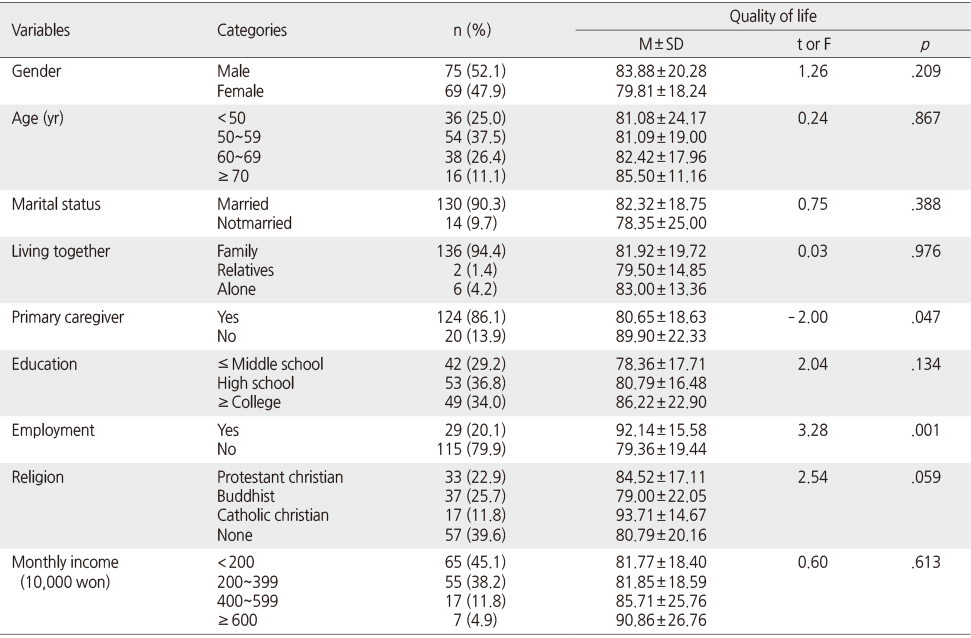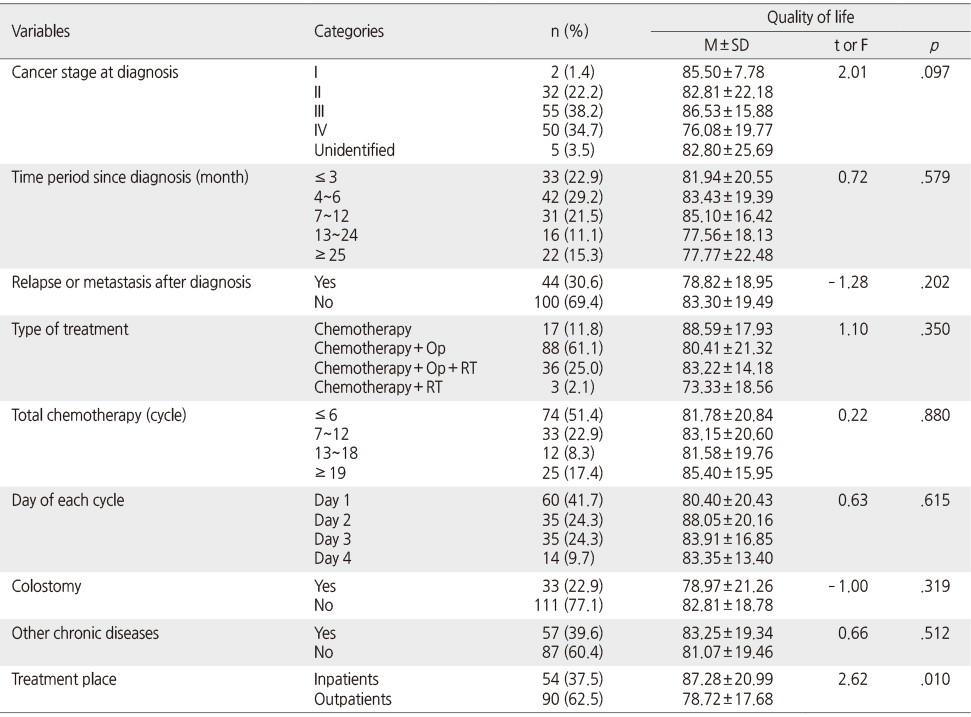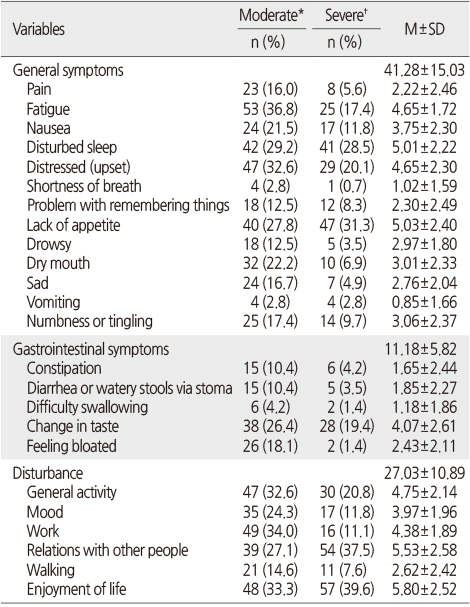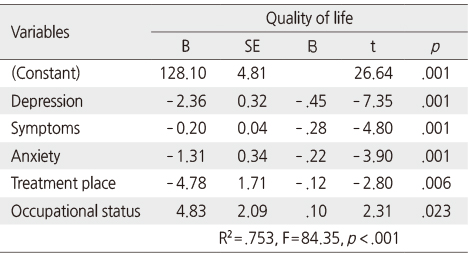Articles
- Page Path
- HOME > J Korean Acad Nurs > Volume 45(4); 2015 > Article
-
Original Article
- Factors Influencing Quality of Life during Chemotherapy for Colorectal Cancer Patients in South Korea
- Yongae Baek, Myungsun Yi
-
Journal of Korean Academy of Nursing 2015;45(4):604-612.
DOI: https://doi.org/10.4040/jkan.2015.45.4.604
Published online: August 31, 2015
1Asan Medical Center, Seoul, Korea.
2College of Nursing · Research Institute of Nursing Science, Seoul National University, Seoul, Korea.
- Address reprint requests to: Yi, Myungsun. College of Nursing · Research Institute of Nursing Science, Seoul National University, 103 Daehag-ro, Jongon-gu, Seoul 03080, Korea. Tel: +82-2-740-8829, Fax: +82-2-765-4103, donam@snu.ac.kr
© 2015 Korean Society of Nursing Science
This is an Open Access article distributed under the terms of the Creative Commons Attribution NoDerivs License. (http://creativecommons.org/licenses/by-nd/4.0/) If the original work is properly cited and retained without any modification or reproduction, it can be used and re-distributed in any format and medium.
Abstract
-
Purpose
- The purpose of this study was to investigate the levels of physical symptoms, anxiety, depression, and quality of life (QOL) during chemotherapy for colorectal cancer patients in South Korea and to identify factors influencing their QOL.
-
Methods
- Data were collected from 144 colorectal cancer patients receiving chemotherapy during 2012 at one general hospital located in Seoul. Physical symptoms were measured by the M. D. Anderson Symptom Inventory-Gastrointestinal Cancer Module, and anxiety and depression were measured by the Hospital Anxiety Depression Scale. QOL was measured by the Functional Assessment of Cancer Therapy-Colorectal. Data were analyzed using descriptive statistics, t-test, one-way ANOVA, Scheffé post hoc test, Pearson correlation and stepwise multiple regression.
-
Results
- Mean age of the participants was 56.6 and most of them were not employed. In terms of cancer stage, 38.2% were in stage 3, followed by stage 4 (34.7%). The most frequent symptom was lack of appetite, followed by sleep disturbance and fatigue. The mean score for anxiety was 5.40 with a prevalence of 23% and that of depression 8.85 with a prevalence of 64.6%. The mean score for quality of life was 81.93 out of 136 and 75.3% of the variance in QOL was explained by depression, symptoms, anxiety, treatment place, and occupational status. Depression was the strongest predictive factor.
-
Conclusion
- Oncology professionals need to pay special attention to relieving depression as well as physical symptoms to improve QOL during chemotherapy for colorectal cancer patients.
This manuscript is based on the part of the first author's master's thesis from Seoul National University.
- 1. National Cancer Information Center. Cancer information service [Internet]. Goyang, Author. 2013;cited 2015 January 8. Available from: http://www.cancer.go.kr/mbs/cancer/subview.jsp?id=cancer_100100000000
- 2. Hong YS, Kim TW. Chemotherapy for colorectal cancer. Korean J Gastroenterol. 2009;54(6):355–363. ArticlePubMed
- 3. Choi KS, Park JA, Lee J. The effect of symptom experience and resilience on quality of life in patients with colorectal cancers. Asian Oncol Nurs. 2012;12(1):61–68. ArticlePDF
- 4. Kim JH, Choi KS, Kim TW, Hong YS. Quality of life in colorectal cancer patients with chemotherapy-induced peripheral neuropathy. J Korean Oncol Nurs. 2011;11(3):254–262. ArticlePDF
- 5. Kim MY. Transition of symptoms and quality of life in cancer patients on chemotherapy. J Korean Acad Nurs. 2009;39(3):433–445. ArticlePubMed
- 6. Alacacioglu A, Binicier O, Gungor O, Oztop I, Dirioz M, Yilmaz U. Quality of life, anxiety, and depression in Turkish colorectal cancer patients. Support Care Cancer. 2010;18(4):417–421. ArticlePubMedPDF
- 7. Lynch BM, Steginga SK, Hawkes AL, Pakenham KI, Dunn J. Describing and predicting psychological distress after colorectal cancer. Cancer. 2008;112(6):1363–1370. ArticlePubMed
- 8. Min HS, Kim JY. Health-related quality of life of patients with rectal cancer. J Korean Soc Coloproctol. 2009;25(2):100–106. Article
- 9. Pachler J, Wille-Jorgensen P. Quality of life after rectal resection for cancer, with or without permanent colostomy. Cochrane Database Syst Rev. 2012;12:CD004323Article
- 10. Cohen J. Statistical power analysis for the behavioral sciences. 2nd ed. Hillsdale, NJ: Lawrence Erlbaum; 1988.
- 11. Cleeland CS, Mendoza TR, Wang XS, Chou C, Harle MT, Morrissey M, et al. Assessing symptom distress in cancer patients: The M. D. Anderson symptom inventory. Cancer. 2000;89(7):1634–1646.ArticlePubMed
- 12. Wang XS, Williams LA, Eng C, Mendoza TR, Shah NA, Kirkendoll KJ, et al. Validation and application of a module of the M. D. Anderson symptom inventory for measuring multiple symptoms in patients with gastrointestinal cancer (the MDASI-GI). Cancer. 2010;116(8):2053–2063. ArticlePubMed
- 13. Yun YH, Mendoza TR, Kang IO, You CH, Roh JW, Lee CG, et al. Validation study of the Korean version of the M. D. Anderson symptom inventory. J Pain Symptom Manage. 2006;31(4):345–352. ArticlePubMed
- 14. Zigmond AS, Snaith RP. The hospital anxiety and depression scale. Acta Psychiatr Scand. 1983;67(6):361–370.ArticlePubMed
- 15. Oh SM, Min KJ, Park DB. A study on the standardization of the hospital anxiety and depression scale for Koreans: A comparison of normal, depressed and anxious groups. J Korean Neuropsychiatr Assoc. 1999;38(2):289–296.
- 16. Ward WL, Hahn EA, Mo F, Hernandez L, Tulsky DS, Cella D. Reliability and validity of the functional assessment of cancer therapy-colorectal (FACT-C) quality of life instrument. Qual Life Res. 1999;8(3):181–195.ArticlePubMedPDF
- 17. Kim H, Yoo HJ, Kim YJ, Han OS, Lee KH, Lee JH, et al. Development and validation of Korean functional assessment cancer therapy-general (FACT-G). Korean J Clin Psychol. 2003;22(1):215–229.
- 18. Kim YJ, Yoo HJ, Kim JC, Han OS. Preoperative quality of life in rectal cancer patients: Male vs female. Korean J Clin Psychol. 2003;22(4):743–762.
- 19. Peddle CJ, Au HJ, Courneya KS. Associations between exercise, quality of life, and fatigue in colorectal cancer survivors. Dis Colon Rectum. 2008;51(8):1242–1248. ArticlePubMed
- 20. Lee SH. A study on professional medical team suppor and information needs of patients with colon cancer [master's thesis]. Seoul, Yonsei University. 2006.
- 21. Jeong JY, So HS, Hong JE, Chae MJ, Han G. Related factors to quality of life among hospitalized cancer patients undergoing chemotherapy. Asian Oncol Nurs. 2012;12(1):84–91. ArticlePDF
- 22. Byun HS, Kim GD. Impacts of fatigue, pain, anxiety, and depression on the quality of life in patients with breast cancer. Asian Oncol Nurs. 2012;12(1):27–34. ArticlePDF
- 23. Suh YO. Predictors of quality of life in women with breast cancer. J Korean Acad Nurs. 2007;37(4):459–466.ArticlePDF
- 24. Miaskowski C, Cooper BA, Paul SM, Dodd M, Lee K, Aouizerat BE, et al. Subgroups of patients with cancer with different symptom experiences and quality-of-life outcomes: A cluster analysis. Oncol Nurs Forum. 2006;33(5):E79–E89. ArticlePubMed
- 25. So WK, Marsh G, Ling WM, Leung FY, Lo JC, Yeung M, et al. The symptom cluster of fatigue, pain, anxiety, and depression and the effect on the quality of life of women receiving treatment for breast cancer: A multicenter study. Oncol Nurs Forum. 2009;36(4):E205–E214. ArticlePubMed
- 26. Dodd MJ, Miaskowski C, Paul SM. Symptom clusters and their effect on the functional status of patients with cancer. Oncol Nurs Forum. 2001;28(3):465–470.PubMed
- 27. Redeker NS, Lev EL, Ruggiero J. Insomnia, fatigue, anxiety, depression, and quality of life of cancer patients undergoing chemotherapy. Sch Inq Nurs Pract. 2000;14(4):275–290.ArticlePubMed
- 28. Tsunoda A, Nakao K, Hiratsuka K, Yasuda N, Shibusawa M, Kusano M. Anxiety, depression and quality of life in colorectal cancer patients. Int J Clin Oncol. 2005;10(6):411–417. ArticlePubMedPDF
- 29. Theobald DE. Cancer pain, fatigue, distress, and insomnia in cancer patients. Clin Cornerstone. 2004;6:Suppl 1D. S15–S21.ArticlePubMed
- 30. Hofman M, Ryan JL, Figueroa-Moseley CD, Jean-Pierre P, Morrow GR. Cancer-related fatigue: The scale of the problem. Oncologist. 2007;12:Suppl 1. 4–10. ArticlePubMedPDF
REFERENCES
Figure & Data
REFERENCES
Citations

- Influences of Patient Activation on Quality of Life in Colorectal Cancer Patients Receiving Chemotherapy through a Chemoport
Hyun Seung Lee, Jeong Hye Kim
Asian Oncology Nursing.2025; 25(4): 206. CrossRef - Disease Perception, Stigma, Distress, Physical Symptom Experience and Quality of Life in Colorectal Cancer Patients Undergoing Chemotherapy: A Cross-Sectional Study
Eun-Hee Lee, Dongwon Choi
Journal of Korean Academy of Fundamentals of Nursing.2024; 31(4): 494. CrossRef - Effects of Family Support and Health Promotion Behaviors on Quality of Life of Cancer Patients after Gastrectomy
Eun Hee Yang, Jeong Hee Kang
Asian Oncology Nursing.2024; 24(4): 196. CrossRef - Anxiety and depression prevalence in digestive cancers: a systematic review and meta-analysis
Mohammad Zamani, Shaghayegh Alizadeh-Tabari
BMJ Supportive & Palliative Care.2023; 13(e2): e235. CrossRef - The Experience of Chemotherapy Related Cognitive Impairment in Patients with Cancer
Pok Ja Oh, Ji Hyun Kim
Asian Oncology Nursing.2022; 22(1): 1. CrossRef - Effect of Ambulatory Chemotherapy (Portable Infusion Pump Use) Video Education on Knowledge, Self-efficacy and Anxiety of Colorectal Cancer Patients
Eun Hee Choi, Eun Young Park, Young A Park, You Hee Son, Myung Jin Jang
Asian Oncology Nursing.2022; 22(3): 193. CrossRef - A Structural Model of Quality of Life in Patients after Colorectal Cancer Surgery
Jeong Won Yeom, Yeon Ok Suh
International Journal of Environmental Research and Public Health.2022; 19(5): 2564. CrossRef - Factors Influencing Supportive Care Needs of Colorectal Cancer Survivors
Hyekyung Kim, Yang-Sook Yoo
Asian Nursing Research.2021; 15(1): 60. CrossRef - Effect of PRM1201 Combined With Adjuvant Chemotherapy on Preventing Recurrence and Metastasis of Stage III Colon Cancer: A Randomized, Double-Blind, Placebo-Controlled Clinical Trial
Ru Jia, Ningning Liu, Guoxiang Cai, Yun Zhang, Haijuan Xiao, Lihong Zhou, Qing Ji, Ling Zhao, Puhua Zeng, Huaimin Liu, Jiege Huo, Xiaoqiang Yue, Yi Zhang, Chaojun Wu, Xiaoting Sun, Yuanyuan Feng, Hongjie Liu, Hui Liu, Zhifen Han, Youying Lai, Yanbo Zhang,
Frontiers in Oncology.2021;[Epub] CrossRef - Comparing the effect of acupressure and ginger on chemotherapy gastrointestinal side-effects in children with leukemia
Magda A. Essawy, Rasha M. Abohadida, Wafaa M. Abd-Elkader, Hoda M. Fathy, Hoda M. Hassab
Complementary Therapies in Medicine.2021; 60: 102730. CrossRef - Experience and Satisfaction of Cancer Patients With a Central Venous Catheter at a Tertiary Hospital in South Korea
Jeong Yun Park, Da In Lee
Journal of Infusion Nursing.2020; 43(2): 97. CrossRef - Changes in chemotherapy-induced peripheral neuropathy, disturbance in activities of daily living, and depression following chemotherapy in patients with colorectal cancer: A prospective study
Pok-Ja Oh, Jung Ran Lee, Sook-Kyoung Kim, Jeong-Hye Kim
European Journal of Oncology Nursing.2020; 44: 101676. CrossRef - The prognoses and postoperative outcomes of patients with both colorectal cancer and liver cirrhosis based on a nationwide cohort in Korea
Nari Shin, Eon Chul Han, Sungho Won, Seung-Bum Ryoo, Eun Kyung Choe, Byung Kwan Park, Kyu Joo Park
Annals of Surgical Treatment and Research.2020; 99(2): 82. CrossRef - Oxaliplatin-induced Peripheral Neuropathy, Symptoms, Distress and Quality of Life among Korean Patients with Gastrointestinal Cancer
Hye Jeong Jung, Soo jung Ahn, Yoo Ri Yang, Kyoung A Kim, Sang Joon Shin, Min Kyu Jung, Sang Hui Chu
Asian Oncology Nursing.2019; 19(4): 204. CrossRef - The Effect of Self-efficacy and Depression on Sense of Family Coherence in Cancer Patients Undergoing Chemotherapy and Primary Caregivers in Day Care Wards: Using the Method Actor-partner Interdependence Model
Eun-Hee Do, Eun Joung Choi
Asian Oncology Nursing.2019; 19(4): 214. CrossRef - Development and Evaluation of Enhanced Recovery After Surgery Program for Patients with Colorectal Cancer Surgery
Eun Ja Kim, Jeong Sook Park
Korean Journal of Adult Nursing.2019; 31(6): 677. CrossRef - Postoperative Weight Changes, Nutritional Status and Clinical Significance of Colorectal Cancer Patients
Sun Young Kim, Ji Sun Kim, Eon Chul Han
Surgical Metabolism and Nutrition.2019; 10(2): 46. CrossRef - The Effect of Symptom Experience, Nutritional Status, and Self Care on Quality of Life in Elderly Patients with Colorectal Cancer
Jeong Won Yeom, Yeon Ok Suh
The Korean Journal of Rehabilitation Nursing.2019; 22(1): 48. CrossRef - Factors influencing quality of life in patients with multiple myeloma
Hee-Young Kang, Eun-Young Choi
Contemporary Nurse.2019; 55(2-3): 109. CrossRef - Distress and Quality of Life in Patients with Esophageal Cancer
Yeon Hwa Ju, Yeon Hee Kim, Jeong Hye Kim
Asian Oncology Nursing.2018; 18(1): 40. CrossRef - Psychosocial Adjustment in Korean Colorectal Cancer Survivors
Hyejin Sun, Jia Lee
Journal of Korean Academy of Nursing.2018; 48(5): 545. CrossRef - Effect of Auricular Acupressure on Nausea, Vomiting, and Retching in Patients with Colorectal Cancer Receiving Chemotherapy
Nayeon Shin, Jummi Park
Korean Journal of Adult Nursing.2018; 30(3): 227. CrossRef - Discomfort related to Peripherally Inserted Central Catheters in Cancer Patient
Misun Yi, Im-Ryung Kim, Eun-Kyung Choi, Seyoung Lee, Mikyong Kwak, Juhee Cho, Jin Seok Ahn, In Gak Kwon
Asian Oncology Nursing.2017; 17(4): 229. CrossRef - Effect of Cancer Symptoms and Fatigue on Chemotherapy-related Cognitive Impairment and Depression in People with Gastrointestinal Cancer
Pok Ja Oh, Jung Ran Lee
Journal of Korean Academy of Nursing.2016; 46(3): 420. CrossRef
Sociodemographic Characteristics of the Participants (N=144)
Disease-related Characteristics of the Participants (N=144)
Op=Operation; RT=Radiation therapy.
Scores of Symptoms and Disturbance (N=144)
*Between 5 and 6 on a 0~10 scale; †7 or greater on a 0~10 scale.
Scores of Anxiety, Depression and Quality of Life (N=144)
Factors Influencing Quality of Life (N=144)
Op=Operation; RT=Radiation therapy.
*Between 5 and 6 on a 0~10 scale; †7 or greater on a 0~10 scale.
 KSNS
KSNS
 E-SUBMISSION
E-SUBMISSION





 Cite
Cite

